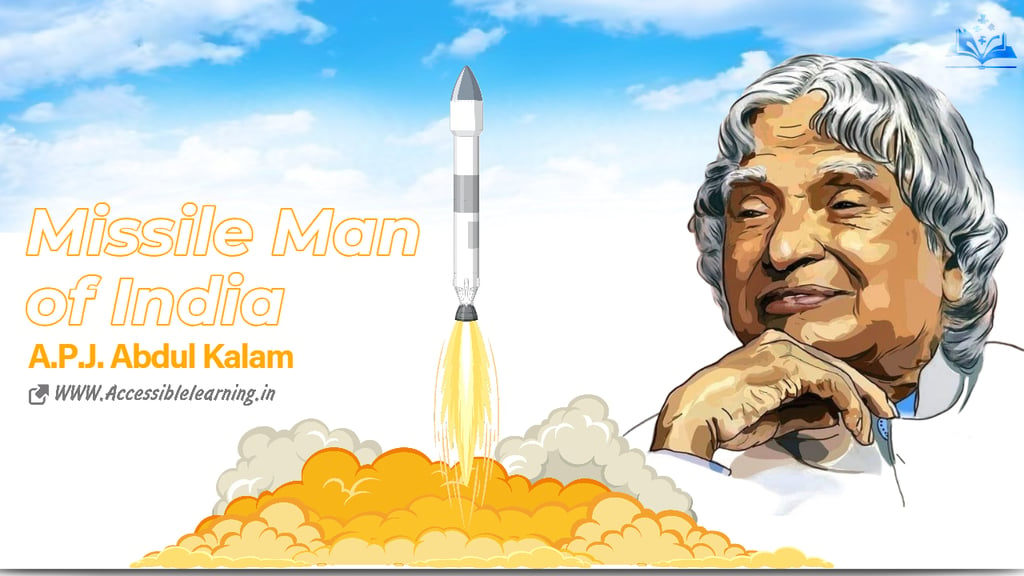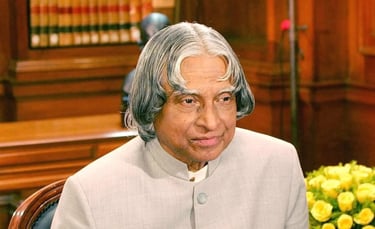
A.P.J. Abdul Kalam: The People's President and Visionary Leader!
Learn about the inspiring life of A.P.J. Abdul Kalam, the Missile Man of India and a visionary leader. Learn about his journey from a humble background to becoming the 11th President of India and how his contributions to science, technology, and education inspired millions!
THE GREAT LEADERBIOGRAPHYGREAT SCIENTISTEDUCATION/KNOWLEDGE
Sachin K Chaurasiya
9/2/20244 min read
Avul Pakir Jainulabdeen Abdul Kalam (अवुल पाकिर जैनुलाब्दीन अब्दुल कलाम), popularly known as the "Missile Man of India" and the "People's President," was a visionary leader, scientist, and teacher whose life and work left an indelible mark on India and the world. Born on October 15, 1931, in Rameswaram, Tamil Nadu, Kalam's journey from humble beginnings to becoming the 11th President of India is a testament to his unwavering dedication, passion for knowledge, and commitment to the nation's development. This article highlights the life, contributions, and legacy of A.P.J. Abdul Kalam Ji and presents an in-depth and humane portrayal of a man who inspired millions.
Early Life and Education
Avul Pakir Jainulabdeen Abdul Kalam was born in the coastal town of Rameswaram to a simple Tamil Muslim family. His father, Jainulabdeen, was a boat owner and imam at the local mosque, while his mother, Ashiamma, was a housewife. Despite the family's limited financial resources, Kalam was inculcated with a deep sense of humility, discipline, and a thirst for knowledge from childhood.
Kalam's early education was at Schwartz Higher Secondary School in Ramanathapuram, where he was an average student but showed a keen interest in learning. His teachers recognized his potential and encouraged him to pursue higher education. After completing his schooling, Kalam enrolled at St. Joseph's College in Tiruchirappalli, where he earned a degree in physics in 1954. However, his passion for aeronautics and engineering led him to the Madras Institute of Technology (MIT), where he earned a degree in aerospace engineering. This decision set the tone for his illustrious career in science and technology.


Career as a Scientist and the Missile Man of India!
After graduating from MIT, Kalam joined the Aeronautical Development Establishment of the Defence Research and Development Organization (DRDO) as a scientist. In the early years of his career, he worked on the development of a small hovercraft, but his true goal came to light when he was transferred to the Indian Space Research Organization (ISRO) in 1969. At ISRO, Kalam played a key role in the development of India's first satellite launch vehicle, the SLV-III, which successfully put the Rohini satellite into orbit in 1980. This achievement marked a significant milestone in India's space program and established Kalam as a key figure in the field of space research.
Kalam's contribution to India's defence technology was equally remarkable. As director of the Integrated Guided Missile Development Programme (IGMDP), he led the development of several successful missiles, including the Agni (अग्नि) and Prithvi ballistic missiles (पृथ्वी बैलिस्टिक मिसाइल), earning him the title of "Missile Man of India.". His work not only strengthened India's defence capabilities but also established the country as a strong player on the global stage.
The Visionary Leader and the 11th President of India
In 2002, A.P.J. Abdul Kalam was elected as the 11th President of India, succeeding K.R. Narayanan. His presidency was characterized by a unique blend of scientific rigour and compassionate leadership that endeared him to people across the country, especially the youth. Kalam's tenure as president was characterized by his unwavering commitment to the country's development and his efforts to bridge the gap between science and society.
One of Kalam's most significant contributions during his presidency was his vision for India's future, which he articulated in his book "India 2020: A Vision for the New Millennium.". In this seminal work, he outlined a roadmap for transforming India into a developed nation by 2020, focusing on sectors such as education, technology, agriculture, and infrastructure. His vision was not only a blueprint for economic progress but also a call to action from every citizen to contribute to the nation's development.
Kalam was also known for his humility and accessibility. He made an effort to connect with students, frequently visiting schools and universities to inspire young minds. His interactions with the youth were characterized by his ability to connect with them on a personal level, share his experiences, and encourage them to dream big. His famous words, "Dream, dream, dream. Dreams turn into ideas, and ideas turn into action," continues to resonate with millions of young people.


Legacy and Impact
A.P.J. Abdul Kalam's legacy extends far beyond his contributions to science and technology. He was the epitome of integrity, perseverance, and selfless service. Even after the presidency, Kalam remained active in public life, devoting his time to teaching, writing, and mentoring the next generation of leaders. He served as a visiting professor at several prestigious institutions, including the Indian Institute of Management (IIM) Shillong, where he was lecturing when he passed away on July 27, 2015.
Kalam's impact on Indian society is profound and lasting. He was a unifying figure who transcended political, religious, and social divides and earned the love and respect of people from all walks of life. His vision for a developed India continues to inspire policymakers, educators, and entrepreneurs, while his emphasis on education and innovation has laid the foundation for a new generation of thinkers and doers.
A.P.J. Abdul Kalam Ji was not just a scientist or a president; he was a visionary who embodied the spirit of India. His life story is a testament to the power of hard work, determination and the relentless pursuit of excellence. When we reflect on his legacy, we are reminded of the values he espoused – humility, honesty and a deep commitment to the greater good. Kalam’s life and work inspire millions, and his vision for a prosperous and developed India remains as relevant today as it was when he first articulated it.
In the words of A.P.J. Abdul Kalam Ji, “You have to dream before you can realize your dreams.” His dream for India and the world is one we all pursue as we strive to build a better, more just and more prosperous future for all.


Subscribe to our newsletter
All © Copyright reserved by Accessible-Learning
| Terms & Conditions
Knowledge is power. Learn with Us. 📚


